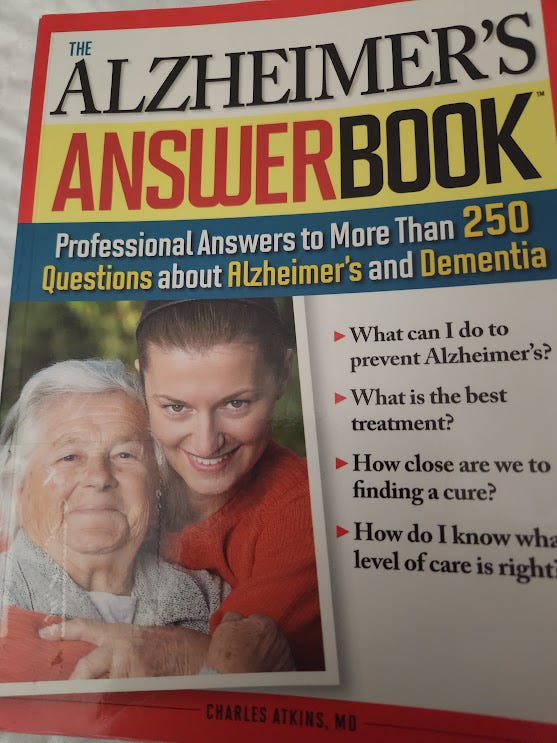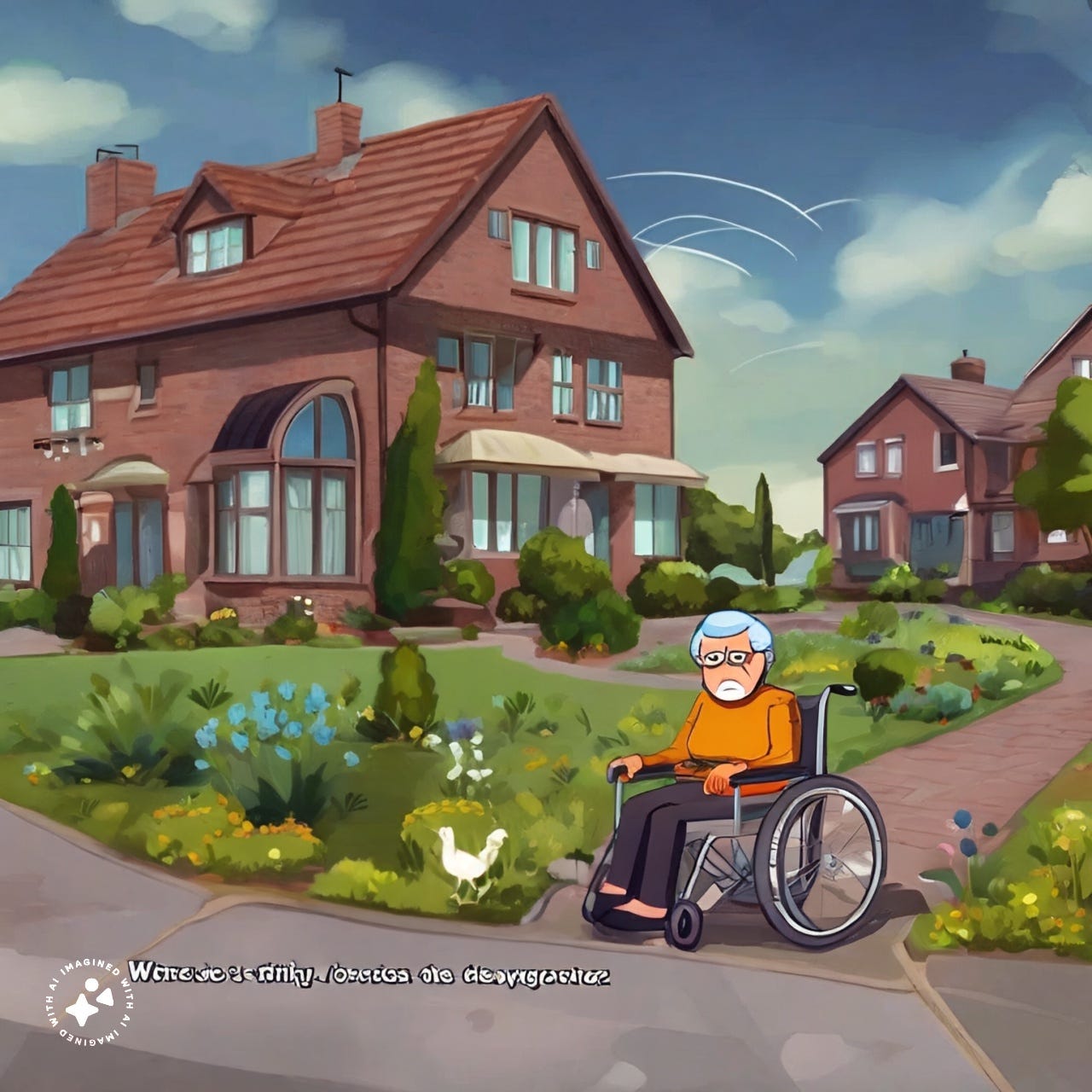Resources for The Long Goodbye
There are several writers on Substack who have faced The Long Goodbye and have shared their experiences. I highly recommend: Amy Brown and her Substack, Living in 3D.
She writes about her relationship with her mother as her mother worked her way through her personal decline. You will have to search her site for the essays on The Long Goodbye because, after her mother’s passing, Amy has continued writing about the remaining “D”s in the title of her Substack. Click on the link below to read an uplifting post about life after dementia.
anticipatory grief
You and AARP
It is my opinion that everyone over the age of 50 should become a member of AARP. It is inexpensive, but it is one of the best memberships you can have. Those of us who are suddenly faced with the need to know more about dementia can find practical advice at the AARP site.
Here is one article that I’m positive you can use:
https://www.aarp.org/health/brain-health/info-2021/dementia-diagnosis-questions.html.
This article contains a brief video by Sanjay Gupta as well a twenty questions you should ask the doctor who gave you the dementia diagnosis.
Dementia Society of America
Website: dementiasociety.org
Features:
Caregiver education programs
Adaptive equipment information
Resource library
Community support programs
Virtual support groups
Resource list for Ideomotor apraxia
Resource List for Ideomotor apraxia: A review - This review summarizes the current understanding of ideomotor apraxia, a disorder affecting the ability to perform skilled movements.
Update on Apraxia - PMC - NCBI - This article provides an overview of apraxia, including the characteristics of ideomotor apraxia.
Limb apraxia and the left parietal lobe - PMC - This chapter examines the role of the left inferior parietal lobe in tool and body representation, action prediction, and action selection, and how these relate to ideomotor apraxia.
Apraxia - This resource defines apraxia, including a section on ideomotor apraxia and its causes.
Apraxia: Review and Update - PMC - This review article discusses the prevalence of apraxia in various neurological disorders and the importance of understanding the condition.
Ideomotor apraxia: A review - This review summarizes the current understanding of ideomotor apraxia, a disorder affecting the ability to perform skilled movements.
Update on Apraxia - PMC - NCBI - This article provides an overview of apraxia, including the characteristics of ideomotor apraxia.
Limb apraxia and the left parietal lobe - PMC - This chapter examines the role of the left inferior parietal lobe in tool and body representation, action prediction, and action selection, and how these relate to ideomotor apraxia.
Apraxia - This resource defines apraxia, including a section on ideomotor apraxia and its causes.
Apraxia: Review and Update - PMC - This review article discusses the prevalence of apraxia in various neurological disorders and the importance of understanding the condition.
An Online Newsletter
This newsletter is published by Careblazers, an organization that is one of my favorites.
This is what the newsletter states will be available if you sign up for the free subscription:
What to expect from the newsletter
Thursday Dementia Dose Newsletter: Every Thursday you will receive our popular Dementia Dose newsletter which has top dementia care tips, resources, and support.
Tuesday Email News Update: Every Tuesday you will receive an email with a new dementia resource or update on dementia news happening in the world.
A Few Brief Welcome Emails: For your first few days as a new email subscriber, you’ll also receive a series of short welcome emails explaining more about our company and how to make your caregiving journey easier and more joyful.
Another Online App
Lately I’ve been treasure hunting and striking gold.
I watched an interview on Instagram between two young women who have had to face this caregiving experience. Their situation isn’t unique; it fits right in with the purpose of my substack efforts.
The interview clearly covers the shock of diagnosis of a loved one and then, using 20/20 hindsight vision, realize that small indications had been happening for a long time. However. both women are very honest about their feelings about their loved one, and they explain how they have been able to cope and give better care to the dementia patient.
There are several minutes at the beginning of the interview that is just chit chat, so don’t get restless. Give them time to get comfortable and move into the main purpose of the interview.
Here is the link: Click here.
Online App
Tik Tok
I’m certain you are shocked I’m suggesting you download and install Tik Tok.
Well, I am suggesting just that. I just discovered that there is a large community on the app that concentrates on dementia, and a lot of it is very good.
I will warn you that some of it is hard to watch. I shed some tears this morning as I reviewed many of the sites included in the app. But, in many ways that is the value of these first-person short videos; they are raw, unscripted, and realistic portrayals of interactions with dementia patients. It isn’t pretty.
Here is a list of key-word phrases I used to narrow my viewing because it is easy to go down rabbit holes if you just search for dementia.
husband wife dementia
wife husband dementia
mother daughter dementia
daughter mother dementia
son father dementia
father son dementia
daughter father dementia
father daughter dementia
I have offered so many variations because I have realized that the sequence affects the results. You should be able to find a set of videos that relates to the struggles you are experiencing.
I will mention one specific person to follow because she shows behaviors, handles the behavior, and then explains what she has done to defuse the situation.
I had difficulty deciding how to give you her name because I seldom log on to Tik Tok, and I am not familiar with the app’s protocol.
Search for debrakostiw . If this doesn’t work you will be able to find her using the key-word phrase daughter mother dementia.
Book
Dementia Behaviors by Grace Southerly
There is a reason many of the resources I list are books. Over the past decade so many advances have been made in understanding the brain and applying the results to the study of dementia. As I have been working with a local library to curate its mental health colletion, it is clear that there has been a multi-year gap in up-to-date information.
A wonderful addition has been made to the publically available books that speak to those of us who have no medical background and who have been stunned by a dementia diagnosis of a loved one. A silver lining to getting the diagnosis is the sudden understanding of the cause of some unusual behavior of a family memlet ber or a friend.
I would really like for you to check with your library, bookstore, or online sites for Dementia Behaviors: Caregivers Survival Guide by Grace Southerly.
By reading the 147 pages of this book you will gain a sense of what is going with the patient. You will also understand two addition concepts: there is a trigger for a patient’s behavior, and, You may be the cause of some of it. This is not meant to sound like judgement of your caregiving; it is meant to let you be aware of the reality of the world the patient has been dropped into. Pages 13-29 will change your view of your situation. Read those pages before dipping into other chapters of the book. Then read those pages again.
Online
I would like to introduce you to Dementia Careblazers.
Here is the Mission Statement of Careblazers.
Dr. Natali is the founder of Dementia Careblazers which she started while working at a busy hospital and wanting to provide more help and support than the short appointments were able to provide.
She wanted to find a way for family members to get not only the information they were looking for, but a community of support they can rely on without having to leave their one with dementia.
That’s why she created Dementia Careblazers, to give instant dementia support for every caregiver in the world.
I have been following Dr. Natali for several months, and two of the benefits I’ve received are a sense of peace and the belief that “I can do this”.
Although there are numerous paid courses that are offered on the site, they are not “pushed” as similar courses are on related blogs and websites. I have not taken any of the courses, but I have benefitted from the generous amount of free materials available. It is almost as though each individual reading her words is her favorite cousin and needs advice.
Websites
United Kingdom National Health Service (NHS)
The National Health Service in the UK has a section on its website regarding vascular dementia. It includes the following pages: Overview, Symptoms, Causes, and Treatments. Click here to go to the section that covers vascular dementia, but you may want to look over the entire site.
Team Helpful
This group has 3000 followers but still seems to be a new entry. Click here for the Facebook page. Click here for the website.
Mental Health America (MHA)
This site has an interesting DIY section which includes online tests to help determine the presence of mental health problems. Remember, things you read on the internet should not be used in place of a doctor’s diagnosis.
Book
You may be real excited to come upon this book.
However, hold back on that excitement.
The publication date is 2008, and you know many things have changed in the diagnosis and treatment of all dementias in the past 15 years. I looked for an update to this specific title, but there wasn’t one.
Another problem is the information about Medicare and Medicade. A lot has gone on with the rules and regulations of these programs.
It is always best that when looking for information you look closely at the date of publication.
Dementia Terms You Should Know
The links in this post will lead you to some sites that explain terms that may come up in your reading, while visiting with caregivers, or in appointments with your doctor or neurosurgeon.
Being informed can take some of the fear and confusion out of the strange and unexpected diagnosis of dementia. Being informed can also give you a sense of having more power to control your emotions and your environment.
This is on a webpage of a law firm in New Jersey. It is, of course, talking about Alzheimer’s dementia, but almost all the terms can relate to dementia due to anyone of the sources. Click here.
A short list of terms:
I understand you'd like a shorter list of key terms. Here are 20 terms related to dementia in alphabetical order:
Aphasia: Difficulty speaking or understanding language.
Apraxia: Difficulty performing learned actions, like using utensils or dressing.
Cognitive decline: General decline in mental abilities, such as memory, thinking, and reasoning.
Delirium: Sudden confusion and changes in perception or awareness.
Dementia: Syndrome characterized by progressive decline in cognitive function affecting memory, thinking, and behavior.
Executive function: Higher-order mental processes like planning, organizing, and decision-making.
Fluctuating cognition: Significant variations in cognitive abilities over short periods.
Global cognitive impairment: Decline in multiple cognitive domains, including memory, thinking, and reasoning.
Lewy body dementia: Dementia caused by abnormal protein deposits in the brain called Lewy bodies.
Mild cognitive impairment (MCI): Early stage of memory decline that may or may not progress to dementia.
Mini-Mental State Examination (MMSE): Common test for cognitive function.
Neuroimaging: Imaging techniques like MRI or PET scans used to visualize the brain.
Neuropsychology: Field of study that focuses on the relationship between brain and behavior, often involved in dementia diagnosis.
Vascular dementia: Dementia caused by impaired blood flow to the brain.
Wandering: Restless roaming often caused by confusion and disorientation.
Here are 5 online sites that contain reliable medical terms and definitions for diagnosing and treating dementia:
1. National Institute on Aging (NIA):
Website: https://www.nia.nih.gov/health/alzheimers-and-dementia
Key features: This is a government website from the National Institutes of Health (NIH), making it a trustworthy source for information on dementia. They have comprehensive and reliable sections on diagnosing, treating, and managing dementia, including glossary pages with clear definitions of medical terms.
2. Alzheimer's Association:
Website:
Key features: This is the leading non-profit organization focused on Alzheimer's disease and dementia. They provide excellent resources for understanding and managing these conditions, including a detailed glossary of terms related to diagnosis, treatment, and research.
3. Mayo Clinic:
Website: https://www.mayoclinic.org/diseases-conditions/dementia/diagnosis-treatment/drc-20352019
Key features: The Mayo Clinic is a trusted medical institution known for its evidence-based information. Their Dementia page features clear explanations of different types of dementia, diagnostic procedures, and available treatment options, along with a dictionary of terms used in these contexts.
4. Cleveland Clinic:
Website: https://mychart.clevelandclinic.org/Authentication/Login?
Key features: Similar to the Mayo Clinic, the Cleveland Clinic provides reliable medical information. Their Dementia page offers informative sections on symptoms, causes, diagnosis, and treatment, accompanied by a helpful glossary of key terms.
5. MedlinePlus:
Key features: This website from the National Library of Medicine provides easy-to-understand information on health topics, including dementia. Their page on dementia explains the various types, risk factors, diagnosis, and management, with definitions of relevant medical terms within the text.
Remember, while these websites provide valuable information, they are not intended to be a substitute for professional medical advice. If you have concerns about yourself or someone you know, it's important to consult with a doctor or qualified healthcare professional for diagnosis and treatment.
Find your state resources
Facilities caring for your loved ones
Governing/Oversight of entities providing Nursing Homes and Home Health Care Agencies.
The list is 60 pages long, so you will scroll to your state to find relevant information. The list is current, but there are often changes in personnel. However, the addresses and phone numbers should always be correct.
The State Survey Agency conducts inspections to certify Nursing Homes and Home Health Care Agencies for Medicare and Medicaid compliance. They also investigate and validate complaints made by individuals.
Click here State Survey Agency or copy the URL below and insert in a search box.
https://www.cms.gov/files/document/state-survey-agency-directory-september-2023.xlsx
Both of the following sites provide information for caregivers of military personnel.
VA Caregiver Support Program
https://www.caregiver.va.gov/support/
National Resource Directory
https://www.nrd.gov
WEBSITE -
This site will give you excellent information about how a dementia diagnosis is determined. It is often confusing and difficult to understand how forgetfulness in the elderly may not be dementia. Click here to get a clear, detailed explanation of how neurologists make a determination. You may be surprised that lab reports are not the source of information.
BOOK -
When Reasoning No Longer Works: A Practical Guide for Caregivers Dealing with Dementia & Alzheimer’s Care by Angel Smits, 2007 (2nd edition)
I have been anxiously waiting to share this book with you. I had requested it through Interlibrary Loan, and it was difficult to find, but after I read the borrowed book, I bought my own copy because I think it is one of the best introductions I’ve found for the new caregiver who is overwhelmed by the prospect of caring for a loved one with dementia. This is a book I wish I had when my son was first diagnosed.
“It doesn’t matter what name we give its cause: Alzheimer’s Disease, Mild Cognitive Impairment, Multi-infarct Dementia . . . the list goes on and on . . .In the end, the person we know and love isn’t the same, leaving us in a position of wanting and needing to help them.”
This comment is in the introduction to the book and describes what a new caregiver is feeling. It is frightening. What is the right thing to do? How do you handle the strangeness of the patient’s behavior?
The book is in three parts: first, a fictionalized story about a couple just becoming aware of the problem; the second part is an explanation of what is happening as the couple goes through the stages of dementia; and the third part is a list of problems that can occur the tips and tricks that the author has gleaned from her own experience and from the family members of her patients.
Smits has written as though she brought information right into your living room and then sat down and started talking to you about the situation you are in.
The book may be difficult to find through a library. The copy my library found was from the O’Fallon Public Library. (120 Civic Plaza, O'Fallon, IL, US, 62269, Phone 618-632-3783, Email reference@ofpl.info}. The book is also available for purchase from Amazon.
WEBSITE -
Click on this link to go to Services by State
It is filled with information and resources for caregivers in every state. Also, each entry has contact information, services offered, etc.
MOVIE -
Still Alice [2014]
This is a beautiful movie focusing on Alzheimer’s disease. I know I promisedd that this site would be about vascular dementia, but this movie shows how any dementia affects the patient and everyone who cares.
ORGANIZATION -
This site is full of focused information about strokes. It will help you understand so much about the effects of a stroke on your loved one. I had to put the word “dementia” into a search box to go to this specific topic because it was not listed in the navigation bar. However, 20 articles immediately came up.
Be sure to click on “In Your Community”; put in your zip code to find local help.
BOOK -
Dementia Untangled: A Caregiver’s Guide to Managing Alzheimer’s and Cognitive Decline in Loved Ones by Luna Carter, Independently published, 2022
The author was the caregiver for her mother for eleven years. Her goal in this book is to share facts, but, more importantly, she attempts to help you, the caregiver, take care of yourself as you take care of the patient.




